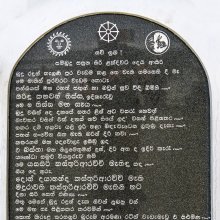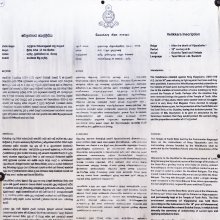Divi, Dīvi: 12 definitions
Introduction:
Divi means something in Hinduism, Sanskrit, Buddhism, Pali, Marathi, Jainism, Prakrit. If you want to know the exact meaning, history, etymology or English translation of this term then check out the descriptions on this page. Add your comment or reference to a book if you want to contribute to this summary article.
Images (photo gallery)
In Hinduism
Purana and Itihasa (epic history)
Source: Cologne Digital Sanskrit Dictionaries: The Purana IndexDivi (दिवि).—A Satya God.*
- * Brahmāṇḍa-purāṇa II. 36. 35.

The Purana (पुराण, purāṇas) refers to Sanskrit literature preserving ancient India’s vast cultural history, including historical legends, religious ceremonies, various arts and sciences. The eighteen mahapuranas total over 400,000 shlokas (metrical couplets) and date to at least several centuries BCE.
Ayurveda (science of life)
Veterinary Medicine (The study and treatment of Animals)
Source: Shodhganga: Portrayal of Animal Kingdom (Tiryaks) in Epics An Analytical studyDivi (दिवि) (lit. “one whose dwelling is heaven [?]”) is a synonym (another name) for the Blue jay (Cāṣa), according to scientific texts such as the Mṛgapakṣiśāstra (Mriga-pakshi-shastra) or “the ancient Indian science of animals and birds” by Hamsadeva, containing the varieties and descriptions of the animals and birds seen in the Sanskrit Epics such as the Ramayana and Mahabharata.

Āyurveda (आयुर्वेद, ayurveda) is a branch of Indian science dealing with medicine, herbalism, taxology, anatomy, surgery, alchemy and related topics. Traditional practice of Āyurveda in ancient India dates back to at least the first millenium BC. Literature is commonly written in Sanskrit using various poetic metres.
Languages of India and abroad
Pali-English dictionary
Source: Sutta: The Pali Text Society's Pali-English DictionaryDivi°, an abstraction fr. divya constructed for etym. explanation of dibba as divi-bhava (°bhāva) of divine existence or character, a divine being, in “divi-bhavāni divyāni ettha atthī ti divyā” SnA 219; “divi-bhavattā dibbā ti” KhA 227; “divibhāvaṃ devattabhāvapariyāpanno ti dibbo” PvA.14. (Page 322)

Pali is the language of the Tipiṭaka, which is the sacred canon of Theravāda Buddhism and contains much of the Buddha’s speech. Closeley related to Sanskrit, both languages are used interchangeably between religions.
Marathi-English dictionary
Source: DDSA: The Molesworth Marathi and English Dictionarydivī (दिवी).—f (divā) A sort of lamp,--a wooden stand or an iron spike supporting a receptacle for the oil.
Marathi is an Indo-European language having over 70 million native speakers people in (predominantly) Maharashtra India. Marathi, like many other Indo-Aryan languages, evolved from early forms of Prakrit, which itself is a subset of Sanskrit, one of the most ancient languages of the world.
Sanskrit dictionary
Source: DDSA: The practical Sanskrit-English dictionaryDivi (दिवि).—The Chāṣa bird (also divaḥ).
Derivable forms: diviḥ (दिविः).
--- OR ---
Dīvi (दीवि).—The blue jay, Chās bird; see दिवि (divi).
Derivable forms: dīviḥ (दीविः).
Source: Cologne Digital Sanskrit Dictionaries: Shabda-Sagara Sanskrit-English DictionaryDivi (दिवि).—m.
(-viḥ) The blue jay. E. div to play, affix ki . cāṣa khage .
--- OR ---
Divī (दिवी).—f. (-vī) A sort of insect; also upajihvikā. E. div to play, vā ī affix, fem. affix ṅīp .
--- OR ---
Dīvi (दीवि).—m.
(-viḥ) The blue jay. E. See divi and kikīdivi, &c.
Source: Cologne Digital Sanskrit Dictionaries: Monier-Williams Sanskrit-English Dictionary1) Divi (दिवि):—[from div] 1. divi m. the blue jay (= kikīdivi), [cf. Lexicographers, esp. such as amarasiṃha, halāyudha, hemacandra, etc.]
2) [v.s. ...] 2. divi [locative case] of 3. div in [compound]
3) Divī (दिवी):—[from div] f. a species of insect (= upa-jihvikā), [cf. Lexicographers, esp. such as amarasiṃha, halāyudha, hemacandra, etc.]
4) Dīvi (दीवि):—[from div] m. the blue jay, [cf. Lexicographers, esp. such as amarasiṃha, halāyudha, hemacandra, etc.] (cf. divi).
Source: Cologne Digital Sanskrit Dictionaries: Yates Sanskrit-English Dictionary1) Divi (दिवि):—(viḥ) 2. m. The blue jay.
2) Divī (दिवी):—(vī) 3. f. A sort of insect.
3) Dīvi (दीवि):—(viḥ) 2. m. The blue jay.
[Sanskrit to German]
Sanskrit, also spelled संस्कृतम् (saṃskṛtam), is an ancient language of India commonly seen as the grandmother of the Indo-European language family (even English!). Closely allied with Prakrit and Pali, Sanskrit is more exhaustive in both grammar and terms and has the most extensive collection of literature in the world, greatly surpassing its sister-languages Greek and Latin.
Prakrit-English dictionary
Source: DDSA: Paia-sadda-mahannavo; a comprehensive Prakrit Hindi dictionary1) Dīvi (दीवि) in the Prakrit language is related to the Sanskrit word: Dvīpin.
Dīvi has the following synonyms: Dīvia.
2) Dīvī (दीवी) also relates to the Sanskrit word: Dīpikā.
Prakrit is an ancient language closely associated with both Pali and Sanskrit. Jain literature is often composed in this language or sub-dialects, such as the Agamas and their commentaries which are written in Ardhamagadhi and Maharashtri Prakrit. The earliest extant texts can be dated to as early as the 4th century BCE although core portions might be older.
Kannada-English dictionary
Source: Alar: Kannada-English corpusDivi (ದಿವಿ):—
1) [noun] the abode of god, angels, etc.; the heaven.
2) [noun] the sky.
3) [noun] the time between sunrise and sunset; a day.
4) [noun] (arith.) a symbol for zero.
--- OR ---
Dīvi (ದೀವಿ):—[noun] a tract of land completely surrounded by water, and not large enough to be called a continent; an island.
--- OR ---
Dīvi (ದೀವಿ):—[noun] = ದೀವಿಗೆ [divige].
Kannada is a Dravidian language (as opposed to the Indo-European language family) mainly spoken in the southwestern region of India.
See also (Relevant definitions)
Starts with (+63): Divi pahauru, Divi-divi, Divi-divi plant, Divia, Diviamga, Divicara, Divicarin, Diviccaga, Divideva, Dividhuvaka, Dividing, Dividivi, Dividivithumma, Dividivitumma, Divigamana, Divigamanaratna, Divigata, Divige, Divihalasu, Divija.
Ends with (+12): Adivi, Ahardivi, Ahodivi, Cilattinpirutivi, Daudivi, Didivi, Divi-divi, Dividivi, Gadivi, Gamdivi, Irattashtivi, Jembudivi, Kadivi, Kikidivi, Lakadadivi, Manudivi, Mativi, Murudivi, Odedivi, Pancadivi.
Full-text (+84): Divija, Divishtha, Divishad, Kikidivi, Kikidiva, Divicara, Diviyoni, Divigamana, Diviyaj, Divishtambha, Divigata, Divikshaya, Divijata, Divicarin, Divikshit, Diviratha, Divya, Paryak, Shrit, Divi-divi plant.
Relevant text
Search found 52 books and stories containing Divi, Divī, Dīvi, Dīvī; (plurals include: Divis, Divīs, Dīvis, Dīvīs). You can also click to the full overview containing English textual excerpts. Below are direct links for the most relevant articles:
Rig Veda (translation and commentary) (by H. H. Wilson)
Chaitanya Bhagavata (by Bhumipati Dāsa)
Verse 3.1.20 < [Chapter 1 - Meeting Again at the House of Śrī Advaita Ācārya]
Verse 2.9.30 < [Chapter 9 - The Lord’s Twenty-One Hour Ecstasy and Descriptions of Śrīdhara and Other Devotees’ Characteristics]
Verse 3.9.232-233 < [Chapter 9 - The Glories of Advaita]
Garga Samhita (English) (by Danavir Goswami)
Verse 6.1.12 < [Chapter 1 - Jarāsandha’s Defeat]
Verse 2.3.20 < [Chapter 3 - Description of the Yamunā’s Arrival]
Verse 2.4.23 < [Chapter 4 - The Liberation of Vatsāsura]
Sahitya-kaumudi by Baladeva Vidyabhushana (by Gaurapada Dāsa)
Text 4.44 < [Chapter 4 - First-rate Poetry]
Shrimad Bhagavad-gita (by Narayana Gosvami)
Verse 11.12 < [Chapter 11 - Viśvarūpa-darśana-yoga (beholding the Lord’s Universal Form)]
Verse 9.20 < [Chapter 9 - Rāja-guhya-yoga (Yoga through the most Confidential Knowledge)]
Verse 18.40 < [Chapter 18 - Mokṣa-yoga (the Yoga of Liberation)]
Brihad Bhagavatamrita (commentary) (by Śrī Śrīmad Bhaktivedānta Nārāyana Gosvāmī Mahārāja)
Verse 2.1.163 < [Chapter 1 - Vairāgya (renunciation)]
Verse 2.2.10 < [Chapter 2 - Jñāna (knowledge)]
Verse 1.4.27 < [Chapter 4 - Bhakta (the devotee)]

